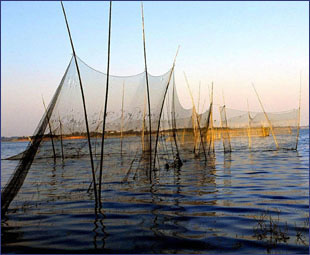| Home / Environment / News | Tools: Save | Print | E-mail | Most Read |
| NPC Deputies Call to Save Poyang Freshwater Lake |
| Adjust font size: |
To date, Poyang Lake benefits not only Jiangxi Province, but is also essential to the whole Yangtze River Delta, said Fu Qionghua, chief engineer with the Jiangxi Water Conservancy Research Institute and an NPC deputy, adding "that its health will also ensure the well-being of the water supply to Jiangsu and Shandong provinces and Tianjin Municipality. It thus stands out as a national strategic storage of water resources." The Fu said that the illegal dams are also interfering with the natural flow of floodwater. Xu Suhui, director of the Jiangsu Provincial Environmental Protection Bureau, revealed a lack of cooperation between local authorities, particularly the fishery, forestry and water conservancy departments. "They lack coordination and cooperation, so law enforcement systems must be reformed," she stressed. Prior to the 1980s, moves to reclaim land from the lake and artificially receding the waters further worsened by rapid population growth, which led to frequent floods and prolonged periods of drought. Since 1998 when the Director Fu explained that the encroachment on water areas is directly related to the area's industrial landscape. "To change the situation, local governments adopt an ecological recovery system which will complement the area's economic development," Fu said. Addressing the need to curb the illegal use of wetlands and fishing resources around the lake, Ni Guoxi and Chen Qinghua, two members of the Chinese People's Political Consultative Conference (CPPCC), submitted a joint proposal to the fifth session of the 10th CPPCC National Committee, calling for precise legislation addressing the implementation of the Poyang Lake ecological protection project. Their plan proposed that the Chinese government place the project under a specialized plan benefiting from tailored investment to rapidly make the lake "a wetland with a good ecology and environment." (China.org.cn by Li Jingrong March 17, 2007) |
| Tools: Save | Print | E-mail | Most Read |
 |
| Related Stories |
|
||||
